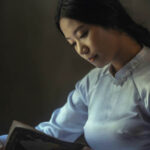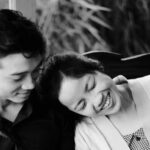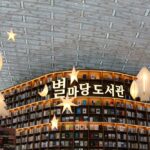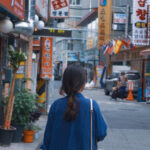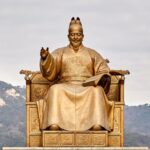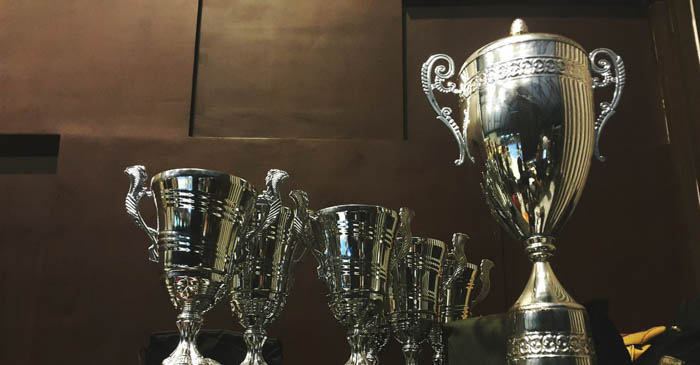
Today, Korean literature is making emphatic ground in the literary world, targeting a wide array of audiences in a variety of backgrounds. With authors who explicitly speak through a narrative that embodies their nationality, Korean novels, poems, and even children’s books present new and inviting literary treasures that are worth exploring.
The novel Simple Sincerity won the Daesan Literary Award, held by the Daesan Foundation, in 2019. In her book, author Cho Hae-jin investigates the underlying concerns of international adoption and Korean US military bases. The author explains that the novel is “literally a novel about sincerity”—the emotions and introspective commotion that the protagonist, an adoptee, experiences as she advances through life. On a broader level, it also explores the isolation that many Korean women face as a result of the underlying problems found within Korea’s historical violence. The literary conception of relatively unknown Korean tribulations is not unusual to Cho’s novel. Many of her other novels also provide deeper insight into the challenges of Korean society. When asked, Cho states that she hopes to allow later generations to understand the difficulties of Korean society and history of past generations through her writing.
Cho Nam-Joo’s novel, Kim Jiyoung, Born 1982, has sold over a million copies, been translated into twelve languages, and has recently been nominated for the National Book Award, one of the most prestigious literary honors in the US. The book follows the life of an everyday woman, recounted in the perspective of a woman who is talking to her therapist. The emphatic point of the fictional protagonist’s story is to emanate how unusually ordinary her life is. Unlike most novels, the story has no dramatic buildup, but plainly tells the life of a Korean woman in her thirties as a relatable contextualization of women in Korean society at that time. Cho states that the novel is a call to cultural realization and a push toward gender equality in Korea, portrayed through an average woman who herself experiences workplace frustration and male compliance throughout her life. A revolutionary novel praised by multiple Korean celebrities, Kim Jiyoung, Born 1982, effectively pushes for feminism and initiates conversations that ignite a call for equality.
The Astrid Lindgren Memorial Award, the world’s most prestigious children’s literature prize, was recently awarded to Baek Hee-Na in order to honor her work in writing and illustrating Korean picture books. A collective award, all of Baek’s thirteen children’s books have received recognition for their unusual and exciting techniques and formations in art. She utilizes paper and cardboard in order to create a mesmerizing and fascinating miniature world that appeals to audiences of all ages. The creation of these three-dimensional environments tells her story in a unique light and brings to life her two-dimensional characters.
Author Han Kang’s novel, The Vegetarian, made waves across the world as readers struggled to absorb the bizarre story of a uniquely structured narrative. The Vegetarian tells the story of a woman who, after having vivid and disturbing nightmares that rest on violence, decides to become a vegetarian. Her husband considers her to be insane, and other members of society also look at her with disdain, particularly as she spirals into mental deficiency caused by depression and her extreme diet. The controversy that surrounds this book, although critically acclaimed, rests on the protagonist’s intriguing mindset of breaking out of societally established bonds through changing her eating habits in an unhealthy fashion. The book serves to deconstruct the taboo ideas of society that molds humans to behave in the way they do. The protagonist’s habits are her way of defying this mold and rejecting the lifestyle that is chosen for her as an act of independence and self-assertion. Published in 2007, the best seller won the 2016 Man Booker International Prize, receiving critical acclaim and sparking dramatic conversation.
Pachinko, written by Min Jin Lee, was an instant success in the literary world, becoming a best seller and winning the Medici Book Club Prize. It was also a finalist for the National Book Award for Fiction and a runner-up for the Dayton Literary Peace Prize. The book follows the life of a young woman in the early 1900s who is born into a humble family. When she unanticipatedly becomes pregnant, a Japanese man offers to take her as his wife, thus resettling her and her entire family into a new country amidst war. The novel narrates a beautiful story of a family that struggles to adjust to a new life and battles with cultural displacement, uniquely painting the conflict within history in Japan and Korea as well as the individual suffering experienced by a young woman who is looking for happiness. Widely praised and claiming a spot in the New York Times’ Ten Best Books of 2017, Pachinko allows for readers to learn and grow with a woman who restlessly searches for a place in which she can truly feel at home.
Although Korean literature may not be widely recognized and read by Americans, it is making its way into the spotlight through a variety of genres and provoking plots by authors that wish to shed light on the beauty of Korean culture, history, and art. These acclaimed works are only a small sample and insight into the unique world of Korean literature that offers stories that influence many and leaves readers with a thirst for more.







